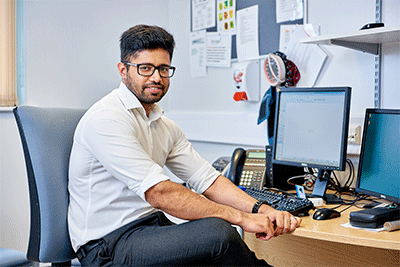了解英国的NHS系统和留学生的医疗服务
英国拥有全世界最大的国民健康与医疗服务系统——NHS(National Health Service,国家医疗服务)。NHS是全球最负盛名的公共医疗系统之一,为英国公民和大部分居住在英国的国际人士提供全面的医疗保障。根据NHS官网的介绍,NHS为全体英国居民提供不分国籍、种族和个人背景的免费医疗服务与健康建议。作为国际学生,我们免不了要和英国的医疗系统打交道,下面我们就来看看NHS如何为国际学生提供医疗服务,以及有什么需要注意的地方吧。
什么是NHS?
NHS成立于1948年,旨在为所有在英国的居民提供免费或低成本的医疗服务。其核心理念是:医疗服务应该基于需求,而非支付能力。因此,在英国生活的大多数人,无论是英国公民还是在英国长期居住的国际人士,都能享受到NHS提供的多项基本医疗服务,例如看病、急诊、住院和部分手术等。
NHS的服务项目非常广泛,覆盖从家庭医生(GP,General Practitioner)到专科医生的多层次医疗服务。重要的是,NHS不仅包括身体健康,还涉及心理健康服务,因此学生在生活压力过大时,也可以寻求相应的心理辅导和支持。

国际留学生如何使用NHS?
对于在英国学习六个月以上的国际留学生,可以通过支付健康附加费(IHS,Immigration Health Surcharge)获得NHS医疗服务。在申请学生签证时,国际学生通常需要支付这笔附加费,金额大约是每年470英镑。一旦支付了IHS,留学生在整个签证有效期内都可以免费使用NHS的基本服务。这意味着,您在英国期间的绝大多数医疗需求都能通过NHS得到满足,无需额外支付医疗费用。
值得注意的是,虽然大部分医疗服务是免费的,但某些特定服务,比如牙科护理和眼科检查,可能需要支付一定的费用。学生可以选择注册大学附近的家庭医生(GP),方便在生病时快速就诊。另外,在英国,医院通常只适用于紧急情况,一般的医疗服务(如感冒发烧或者轻微身体不适)通常都只能通过预约GP来解决。

如何注册家庭医生(GP)?
注册家庭医生是使用NHS系统的第一步。在萨里大学,学校会帮助新生了解如何注册GP的流程。通常,您只需提供您的居住地址、护照和签证信息,填写相关表格即可完成注册。一旦注册成功,您便可以在需要时预约GP看病。
在日常生活中,如果您有任何身体不适,通常的流程是先预约家庭医生进行初诊。如果医生认为您的情况需要进一步的专科治疗或检查,他们会为您转介到相应的医院或专科医生。

急诊和紧急医疗服务
如果您在英国遇到紧急医疗情况,可以拨打999紧急电话,或者直接前往当地医院的急诊部门(A&E,Accident and Emergency)。急诊服务是免费的,适用于所有需要紧急医疗帮助的人。
此外,如果您不是很确定自己的病情是否需要急诊,可以拨打NHS 111热线,咨询非紧急医疗建议。这条热线会帮助您评估病情,并告诉您下一步应该如何处理。

处方药和药房服务
在NHS体系下,医生开出的处方药通常是需要付费的。每次处方药的固定费用大约为9英镑(2024年数据),无论药物本身的实际价格是多少。不过,如果您患有慢性疾病或需要长期服药,可以申请一张药品预付卡(PPC,Prescription Prepayment Certificate),以降低药品费用。
药房在英国非常普遍,您可以在校园附近或市中心找到许多药店。大部分药房除了出售处方药之外,还提供非处方药、健康咨询和小型诊疗服务。

心理健康支持
留学生在适应新环境时,难免会遇到生活、学习和文化上的挑战。NHS的心理健康服务(IAPT,Improving Access to Psychological Therapies)为所有人提供心理咨询和辅导,帮助学生应对压力、焦虑、抑郁等心理问题。萨里大学也为学生提供免费的心理健康支持服务,包括辅导、心理治疗和各种线上资源,即Centre for Wellbeing。
总结
作为一名国际学生,了解和使用NHS医疗服务非常重要。NHS不仅能帮助我们解决日常健康问题,还能在紧急情况下提供迅速有效的救助。通过支付健康附加费,我们可以在英国享受几乎免费的医疗服务,大大减轻了留学期间的医疗负担。总而言之,大家到达英国后,应当尽快注册GP服务,并且了解在遇到不同程度的健康问题时,该如何寻求帮助。
图片来源:NHS ENGLAND
The United Kingdom is home to the world’s largest public healthcare system – the NHS (National Health Service). Renowned globally, the NHS provides comprehensive healthcare services to British citizens and the vast majority of international residents in the UK. According to the official NHS website, the service offers free healthcare and medical advice to all UK residents, regardless of nationality, ethnicity, or personal background. As international students, we are bound to interact with the UK healthcare system at some point, so let’s take a closer look at how the NHS supports international students and what you need to know.
What is the NHS?
The NHS was established in 1948 with the goal of providing free or low-cost healthcare to everyone living in the UK. Its core principle is that healthcare should be based on need, not on the ability to pay. As a result, most people living in the UK, whether British citizens or international residents, can access various essential NHS services, such as GP (General Practitioner) consultations, emergency care, hospital treatment, and certain surgeries.
The NHS offers a wide range of services, from general practitioners to specialist doctors. Crucially, it doesn’t just cover physical health; the NHS also includes mental health services, so if students are struggling with stress or pressure, they can seek appropriate counselling and support.
How can international students use the NHS?
International students studying in the UK for more than six months are eligible for NHS healthcare by paying the Immigration Health Surcharge (IHS). When applying for a student visa, international students typically pay this surcharge, which is around £470 per year. Once you’ve paid the IHS, you’ll have access to most NHS services at no extra cost during your visa period. This means that the majority of your healthcare needs while in the UK can be met through the NHS without additional fees.
It’s important to note that while most services are free, some specific services, such as dental care and eye tests, may require a payment. Students are encouraged to register with a local GP near their university, making it easier to book an appointment when unwell. Additionally, in the UK, hospitals are generally reserved for emergencies, so for minor health issues such as colds or mild ailments, you’ll usually need to book an appointment with a GP.
How to register with a GP?
Registering with a GP is the first step in accessing NHS services. At the University of Surrey, the university provides guidance to help new students with the GP registration process. Typically, you’ll need to provide proof of your address, passport, and visa details to complete a registration form. Once registered, you can book appointments with the GP whenever you need medical attention.
In daily life, if you’re feeling unwell, the usual process is to make an appointment with your GP for an initial assessment. If the GP thinks you need further specialist care or tests, they will refer you to the appropriate hospital or specialist.
Emergency and urgent medical services
If you experience a medical emergency in the UK, you can call 999 for an ambulance, or go directly to the nearest Accident & Emergency (A&E) department at a hospital. A&E services are free and available to anyone who needs urgent medical attention.
If you’re unsure whether your condition requires emergency care, you can call the NHS 111 helpline for non-emergency medical advice. This service will help you assess your symptoms and recommend the next steps.
Prescription medication and pharmacies
Under the NHS, prescription medicines usually require a payment. The current standard charge for a prescription is around £9 per item (2024 data), regardless of the actual cost of the medicine. However, if you have a chronic condition or need long-term medication, you can apply for a Prescription Prepayment Certificate (PPC) to help reduce the cost.
Pharmacies are common throughout the UK, and you can find many in town centres or near university campuses. Most pharmacies offer over-the-counter medicines, health advice, and even minor medical treatments in addition to filling prescriptions.
Mental health support
Adapting to a new environment can present challenges in terms of lifestyle, studies, and cultural differences. The NHS’s mental health service, known as IAPT (Improving Access to Psychological Therapies), provides counselling and therapy to help individuals cope with stress, anxiety, depression, and other mental health issues. At the University of Surrey, students also have access to free mental health support services, including counselling, therapy, and online resources via the Centre for Wellbeing.
In summary
As an international student, understanding and using NHS healthcare services is vital. The NHS not only helps us address routine health issues, but also provides swift and effective assistance in emergencies. By paying the Immigration Health Surcharge, we can benefit from nearly free healthcare while studying in the UK, significantly reducing the financial burden of medical expenses.
In conclusion, it’s essential to register with a GP upon arriving in the UK and familiarise yourself with how to seek help for different levels of health concerns.
Image: NHS ENGLAND
